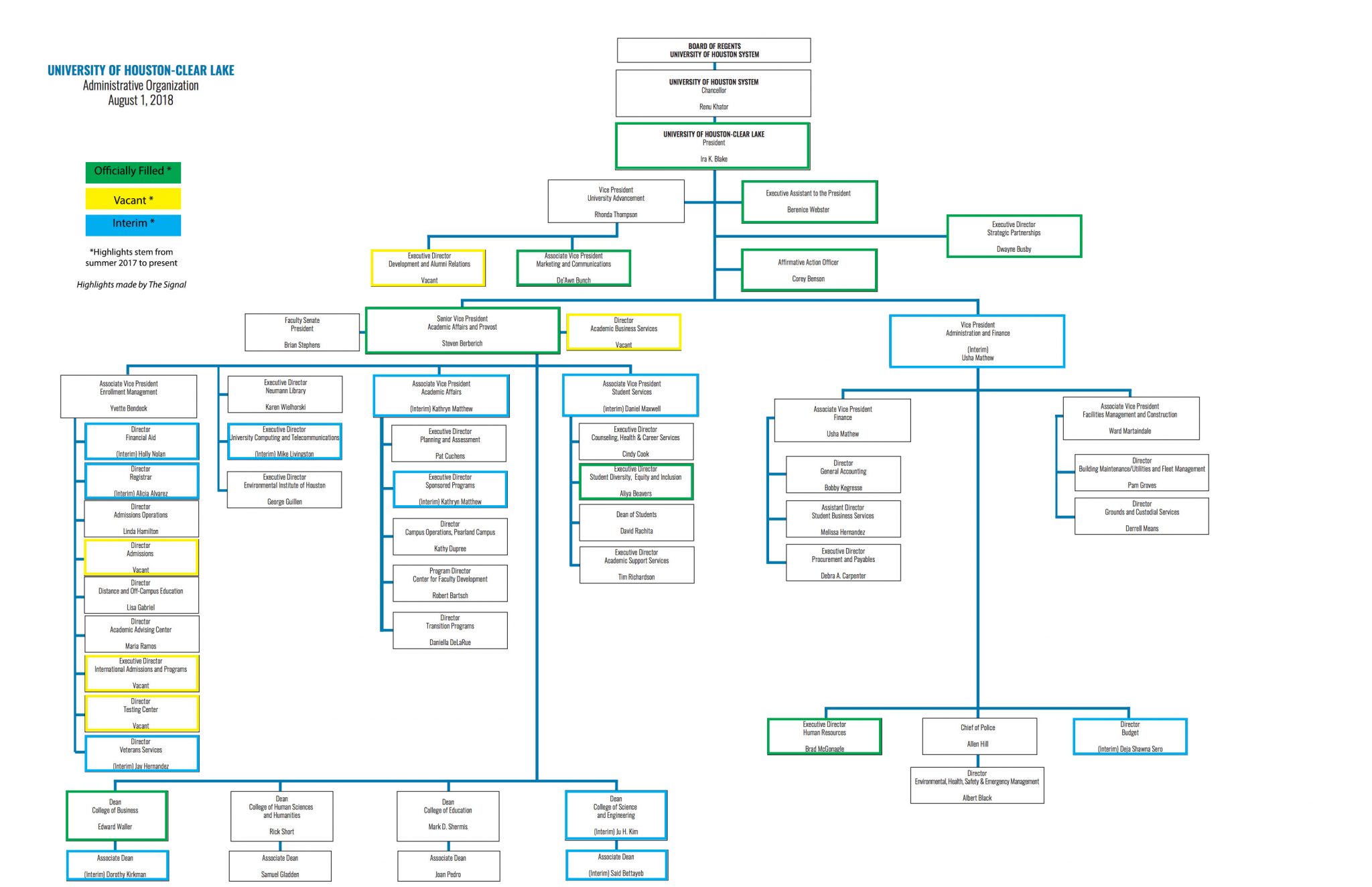EDITORIAL: Why open executive-level searches should always be conducted
At any institution of higher education, there are transitions and appointments of power. This power to change and influence stems from the executive-level positions, which significantly impact a university, shared governance and the community at large. In the last year, over eight key executive level positions at the University of Houston-Clear Lake (UHCL) have been officially filled, including a new president and senior vice president for academic affairs and provost. This number does not include positions in the process of being filled or interim positions.
Currently, four executive searches being conducted at UHCL consist of vice president for administration and finance, executive director of financial aid, executive director of international admissions and programs, and executive director of planning and assessments for the College of Education.
While executive-level position searches have traditionally been conducted through open searches, whether or not a search is open is per the discretion of the direct supervisor or search committee chair. Closed searches are intended to protect the identity of candidates from discovery by present employers. However, open searches serve to protect the best interest of UHCL by permitting public participation.
Search committee basics and standards
Typically, as per hiring policies found at the UHCL and UH System levels, once a position is approved, a search committee is formed in line with shared governance committees, which are comprised of representatives from offices and departments across campus.
From there, the Office of Title IX/Equity and Diversity provides search committee members with training in regard to the interview process in order to ensure equal employment opportunity and prevent discrimination.
These committees first meet to establish the position description and prepare to post the job. Then, the committee works with Human Resources to have the job posted via various outlets. Following the posting, the committee members evaluate and narrow down the pool of potential candidates based on resumes, curriculum vitaes and phone interviews.
Lastly, committees will check a minimum of two professional references and vet the candidates prior to campus visits. It is unclear if a policy is in place regarding the incorporation of online searches in the vetting process or if it is determined per the discretion of the committee chair. Some search committees have been advised against Googling a candidate based on equal opportunity concerns.
During campus visits, candidates are traditionally required to give open presentations over a selected topic, even though it is not stated in UHCL or UH System hiring policies. These open presentations, when given, allow the UHCL community to attend and ask questions.
University-wide open presentations are vital to job searches, especially at the executive level, as it allows for transparency. At public universities, transparency is crucial in order to build trust and protect the interests of students, faculty and staff.
In addition, the Q&A portion of the presentations allows the community to be involved in the search process. This type of open forum for opinions is similar to the UHCL shared governance system, in that various representatives within the university community have an opportunity to speak. The open forum presentations allow attendees to directly question the candidates and provide feedback to the search committee.
Minimizing public distrust and ill-informed hiring decisions
By conducting open searches for executive-level positions, the UHCL community has the chance to vet the candidates via online searches and open forum presentations. This allows for any concerns to be brought to the attention of the search committees and addressed.
While confidentiality of a candidate’s identity aids in minimizing the risk of being found in search of a new job by a current employer, it increases the risk of ill-informed hiring decisions and public distrust.
In 2018, it is extremely naïve to assume one would not be Googled when applying for a position of any kind. If not by the search committee, then by the UHCL community either during the search process or after the new hire announcement. Thus, regardless of if a policy is in place or not, a candidate should be prepared to answer questions raised by both a concerned search committee and public.
Votes of no confidence, lawsuits directly and indirectly involving candidates, and allegations of poor professional behavior – all of which Google searches have revealed about potential hires at UHCL in recent years – raises questions that would be better addressed during the search process as opposed to leaving a new hire vulnerable to suspicion. However, this becomes tough to do if searches are not conducted openly and committees are advised against online research.
Transitioning into a transparent university
Why is any of this important? Does it really matter what someone may or may not have been involved in at a previous place of employment? These questions are necessary because it speaks to the type of university UHCL is transitioning toward and how decisions are implemented and enforced.
Executive-level position holders possess the power and influence to shape not just the university, but also its community. Decisions regarding policy, procedures and processes impact students, faculty and staff. From smoking policies to new buildings to hiring processes, executives at UHCL can indirectly hinder or enhance one’s experience at the university.
It is crucial then, that executive-level candidates are given the opportunity to publically address community concerns. University-wide open presentations allow for the candidate to be transparent and for the UHCL community at large to be given a voice in the selection process beyond a handful of search committee representatives.
In a time where trust is essentially the greatest form of currency, transparency at public universities is key in keeping the literal and figurative doors open. An executive’s previous employment issues should not be the ultimate decider regarding position offers. However, chances to address and clarify these issues should always be given. Thus, UHCL needs to reevaluate its hiring process and make university-wide open presentations for executive-level positions mandatory and publicly advertised.

Also published on Medium.

